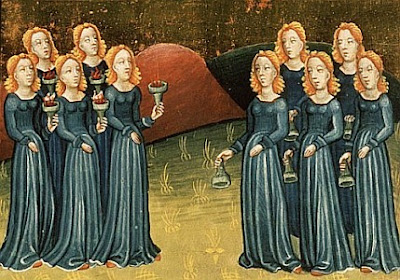First Reading (Ezekiel 34:11-12, 15-17)
Thus says the Lord GOD:
I myself will look after and tend my sheep.
As a shepherd tends his flock
when he finds himself among his scattered sheep,
so will I tend my sheep.
I will rescue them from every place where they were scattered
when it was cloudy and dark.
I myself will pasture my sheep;
I myself will give them rest, says the Lord GOD.
The lost I will seek out,
the strayed I will bring back,
the injured I will bind up,
the sick I will heal,
but the sleek and the strong I will destroy,
shepherding them rightly.
As for you, my sheep, says the Lord GOD,
I will judge between one sheep and another,
between rams and goats.
Asking the big questions: Is there anything that stuck out to you from this reading? What are ways God may look out for us (His sheep) everyday? How will God judge between the sheep? How can we prepare for this?
Responsorial Pslam (Psalm 23:1-2, 2-3, 5-8)
R. (1) The Lord is my shepherd; there is nothing I shall want.
The LORD is my shepherd; I shall not want.
In verdant pastures he gives me repose.
R. The Lord is my shepherd; there is nothing I shall want.
Beside restful waters he leads me;
he refreshes my soul.
He guides me in right paths
for his name's sake.
R. The Lord is my shepherd; there is nothing I shall want.
You spread the table before me
in the sight of my foes;
you anoint my head with oil;
my cup overflows.
R. The Lord is my shepherd; there is nothing I shall want.
Only goodness and kindness follow me
all the days of my life;
and I shall dwell in the house of the LORD
for years to come.
R. The Lord is my shepherd; there is nothing I shall want.
Second Reading (1 Corinthians 15:20-26, 28)
Brothers and sisters:
Christ has been raised from the dead,
the firstfruits of those who have fallen asleep.
For since death came through man,
the resurrection of the dead came also through man.
For just as in Adam all die,
so too in Christ shall all be brought to life,
but each one in proper order:
Christ the firstfruits;
then, at his coming, those who belong to Christ;
then comes the end,
when he hands over the kingdom to his God and Father,
when he has destroyed every sovereignty
and every authority and power.
For he must reign until he has put all his enemies under his feet.
The last enemy to be destroyed is death.
When everything is subjected to him,
then the Son himself will also be subjected
to the one who subjected everything to him,
so that God may be all in all.
Gospel (Matthew 25:31-46)
Jesus said to his disciples:
"When the Son of Man comes in his glory,
and all the angels with him,
he will sit upon his glorious throne,
and all the nations will be assembled before him.
And he will separate them one from another,
as a shepherd separates the sheep from the goats.
He will place the sheep on his right and the goats on his left.
Then the king will say to those on his right,
'Come, you who are blessed by my Father.
Inherit the kingdom prepared for you from the foundation of the world.
For I was hungry and you gave me food,
I was thirsty and you gave me drink,
a stranger and you welcomed me,
naked and you clothed me,
ill and you cared for me,
in prison and you visited me.'
Then the righteous will answer him and say,
'Lord, when did we see you hungry and feed you,
or thirsty and give you drink?
When did we see you a stranger and welcome you,
or naked and clothe you?
When did we see you ill or in prison, and visit you?'
And the king will say to them in reply,
'Amen, I say to you, whatever you did
for one of the least brothers of mine, you did for me.'
Then he will say to those on his left,
'Depart from me, you accursed,
into the eternal fire prepared for the devil and his angels.
For I was hungry and you gave me no food,
I was thirsty and you gave me no drink,
a stranger and you gave me no welcome,
naked and you gave me no clothing,
ill and in prison, and you did not care for me.'
Then they will answer and say,
'Lord, when did we see you hungry or thirsty
or a stranger or naked or ill or in prison,
and not minister to your needs?'
He will answer them, 'Amen, I say to you,
what you did not do for one of these least ones,
you did not do for me.'
And these will go off to eternal punishment,
but the righteous to eternal life."












.jpg)
